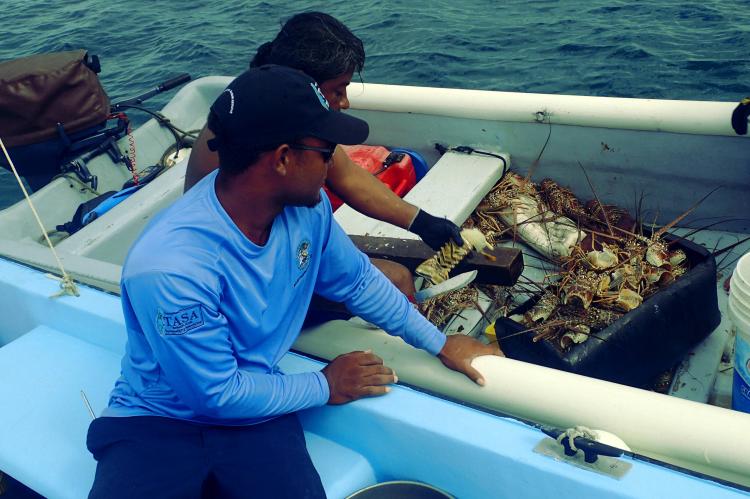What the Law Says vs. What Justice Demands
By: Omar Silva I Editor/Publisher
National Perspective Belize
Belize City: Thursday 23rd October 2025
There comes a point when the law must look beyond the letter and see the life it affects. Such is the dilemma of Belize’s small fisherfolk, who are being crushed under the same penalties meant for industrial poachers. Their crime: survival. Their punishment: destitution.
The Fisherman’s Reality
The fisherman in question is not an outlaw but a man trying to eat. His small catch—hardly enough to fill a basket—was deemed illegal under the Fisheries Act, and for that, the court imposed a fine he could never afford. The law says he broke it. But justice demands that we ask why.
Across Belize’s coastline and cayes, hundreds of artisanal fishers face the same daily struggle: fish or starve. For them, a day without catch is a day without bread. Yet, under the current Fisheries Act, no distinction exists between industrial greed and subsistence need. The scales of justice have forgotten their balance.
The Law in Black and White
Belize’s Fisheries Resources Act, 2020 (FRA) was hailed as a modern framework for sustainability. It proudly declares that “the welfare and livelihoods of fishers and the fishing community shall be improved.” That principle sits at the heart of Section 7.
But when one turns the page, the reality is crueler. The penalty clauses and subsidiary regulations still enforce a one-size-fits-all approach—harsh fines and imprisonment with no regard for circumstance, intent, or scale. The same law that vows to uplift the fisher’s welfare is now weaponized against him.
Regulations under the FRA prescribe fixed penalties—often between BZD $1,000 and $5,000, or up to 12 months imprisonment—for violations ranging from undersized catch to off-season fishing. No clause allows a magistrate to consider whether the offender is a commercial operator or a struggling family man trying to feed his children.
This is not balance; it is blindness.
A Law Without Compassion
A humane fisheries policy should never criminalize poverty. Yet the absence of discretionary latitude in the law means that prosecutors and magistrates are bound to apply the same penalties across vastly unequal circumstances.
In effect, we have a law that punishes survival while letting the well-connected negotiate settlements behind closed doors. It is not uncommon to see large-scale operators evade accountability through “administrative agreements” while the small fisher becomes a public example of enforcement success.
If conservation is our goal, then equity must be our guide. True regulation is not about the number of arrests—it’s about cultivating compliance through fairness and understanding.
Belize can and must modernize its fisheries justice system without compromising sustainability. Reform is not about leniency—it is about proportionality.
Here’s what justice demands:
- Anchor Proportionality in the Law
Amend the Fisheries Act to make socioeconomic circumstance and scale of infraction mandatory considerations in sentencing.
- Tiered Penalty System
Introduce a four-level system:
- Tier 0: Warning and education for minor, first-time subsistence violations.
- Tier 1: Means-tested fines or community service.
- Tier 2: License suspension for repeat minor offences.
- Tier 3: Heavy fines and imprisonment for commercial-scale or repeat violators.
- Means-Tested Fines (Day-Fine System)
Peg fines to income or catch value—ensuring penalties punish negligence, not poverty.
- Alternative Sentencing
Allow community service, marine stewardship hours, or mandatory workshops instead of automatic fines or imprisonment.
- Subsistence Defence Clause
Provide legal relief for minimal, non-commercial catches made under genuine survival conditions.
- Sentencing Guidelines and Transparency
Require prosecutors and magistrates to justify penalties in writing, ensuring consistency and accountability.
- Empower Co-Management Bodies
Managed Access committees and cooperatives should recommend rehabilitative sanctions, promoting shared responsibility for marine sustainability.
- Education Over Humiliation
Every arrest should become an opportunity for education—not a symbol of state cruelty.
The Spirit of the Law vs. the Letter of the Law
The 2020 Act envisioned Belize as a model of sustainability—balancing ecology with livelihoods. Yet, in practice, the Act protects coral but crushes communities.
The irony is painful: those who depend most on the sea are the ones punished most severely for touching it.
True justice lies not in enforcing laws blindly, but in applying them wisely. The goal of fisheries management is not to create criminals—it is to create stewards. If Belize continues to wield the law without compassion, it risks turning its fishers into fugitives instead of guardians of the reef.
A Call for Humane Enforcement
The law should serve people, not the other way around. When justice ceases to protect the vulnerable, it becomes just another net—ensnaring those least able to escape.
Belize stands at a moral crossroads. It can continue down the path of mechanical enforcement, or it can lead the Caribbean by crafting a new model—a Fisheries Justice System—where sustainability and humanity coexist.
Because what the law says matters.
But what justice demands matters more.
- Log in to post comments


